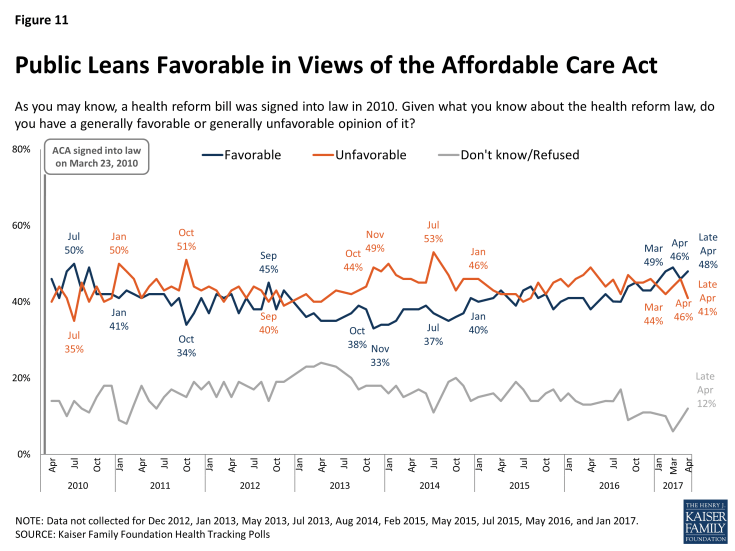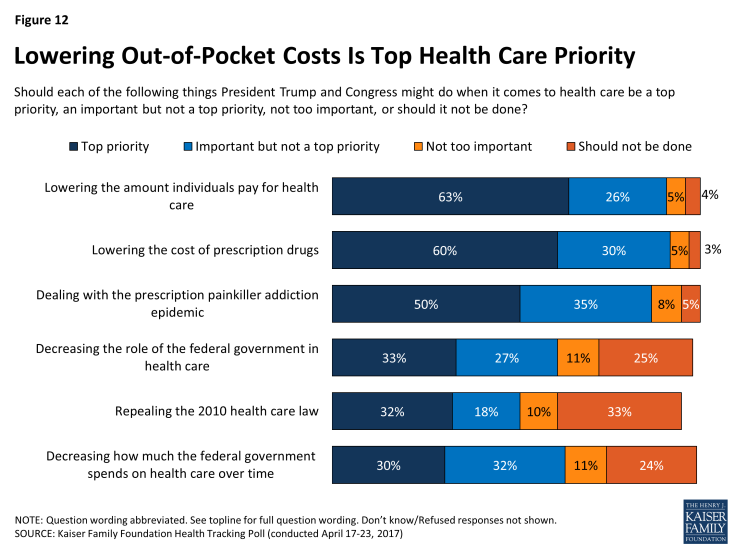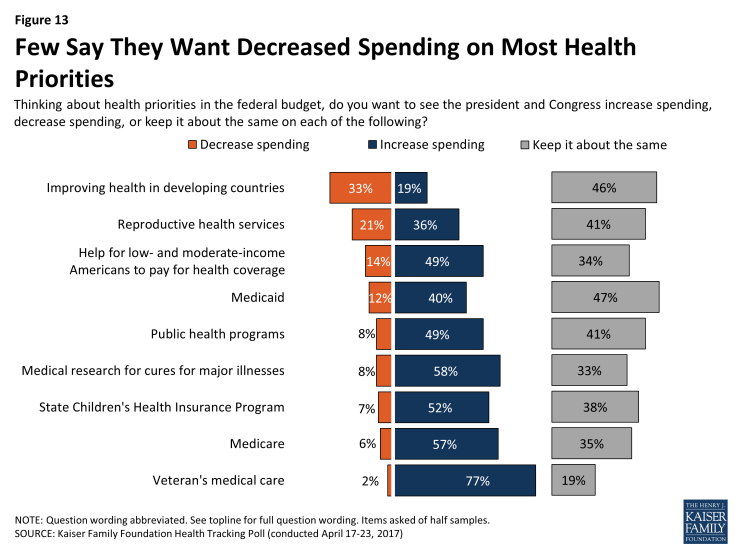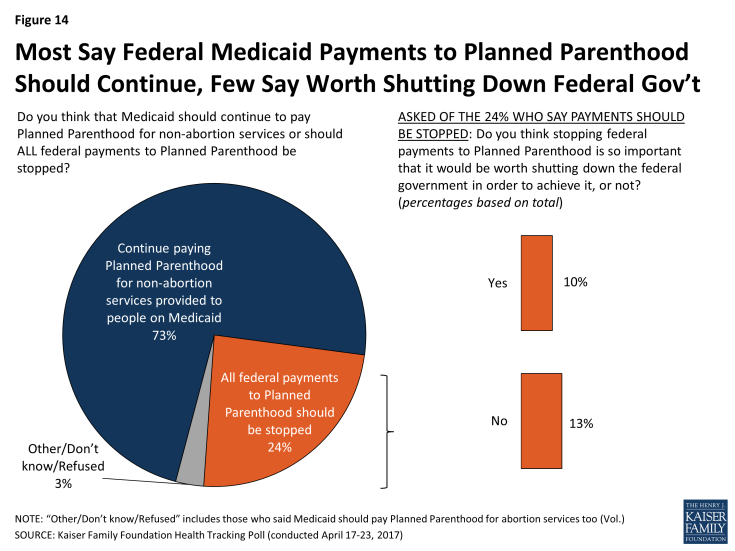Kaiser Health Tracking Poll - Late April 2017: The Future of the ACA and Health Care & the Budget
KEY FINDINGS:
- President Trump recently said he may stop payments for the Affordable Care Act’s (ACA) cost-sharing reductions in order to get Democrats to start negotiating on a replacement for the 2010 health care law.1 The majority of the public (60 percent) thinks President Trump should not use negotiating tactics like these that could disrupt insurance markets and cause people to lose health coverage – including the majority of Democrats (82 percent) and independents (66 percent). On the other hand, a majority of Republicans (67 percent) say President Trump should use whatever negotiating tactics necessary to win support for a replacement plan. Most Americans (70 percent) say uncertainty around the future of the law is hurting those who purchase their own health insurance.
- The public is more favorable (48 percent) than unfavorable (41 percent) in their views of the 2010 health care law this month. Despite this, somewhat more Americans want President Trump and Republican lawmakers to keep working on a plan to repeal and replace the ACA than want them to stop working on health care and move on to other priorities (51 percent vs. 43 percent).
- For most, repealing the ACA falls behind other health care priorities such as lowering the amount individuals pay for health care and lowering the cost of prescription drugs – which consistently top the list of health care priorities. Among Republicans, repealing the ACA is a top health care priority, with about one-fourth saying it is the “most important priority” for President Trump and Congress when it comes to health care.
- With the legislative path for repeal still unclear, three-fourths (74 percent) of Americans say that President Trump and his administration should do what they can to make the current health care law work. Large majorities of the public say Republicans in Congress and President Trump and his administration have at least some control over whether the current health care works or fails – including many who say they have “a lot” of control. Furthermore, a majority (64 percent) of the public – including 53 percent of Republicans – say that because President Trump and Republicans in Congress are now in control of the government, they are responsible for any problems with the ACA moving forward.
- With lawmakers negotiating current federal budget priorities, relatively few Americans want to see the president and Congress decrease funding for a variety of different health priorities – including spending for reproductive health services for lower-income women (21 percent). Overall, one-fourth (24 percent) of the public says that federal Medicaid payments to Planned Parenthood for non-abortion services should be stopped but few (10 percent) think stopping these payments is important enough to shut down the federal government.
The Future of the ACA
With the ongoing debate about the future of the 2010 health care law, this month’s survey examines the public awareness of and attitudes about some recent developments related to the future of law, including uncertainty about cost-sharing reduction payments and insurers opting out of some health insurance marketplaces.
Cost-Sharing Reductions
Under the Affordable Care Act (ACA), financial help is available to low-income people who buy their own health insurance to lower their deductibles and co-payments, sometimes called “cost-sharing reductions” (CSRs). The federal government pays insurance companies to help cover these costs. About half of the public (49 percent) is aware that the ACA provides this type of financial help to lower-income people. Republicans are much more likely than Democrats to say the health care law does not provide this type of assistance (50 percent vs. 29 percent), suggesting that perceptions about what the law includes can be shaped by partisanship.
In addition, 44 percent of the public say they have heard at least some about President Trump saying the federal government may stop making these payments, which experts say would likely cause insurers to raise premiums or stop offering coverage.
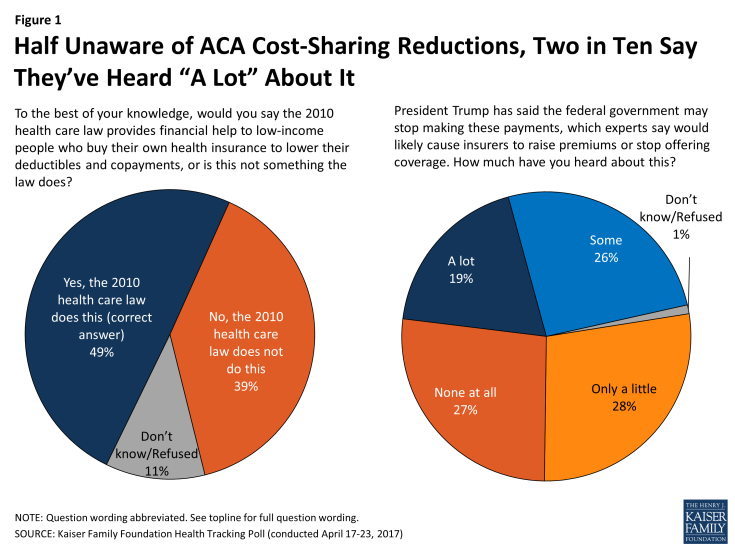
Figure 1: Half Unaware of ACA Cost-Sharing Reductions, Two in Ten Say They’ve Heard “A Lot” About It
Majority of Republicans Approve of President Trump’s Negotiating Tactics
President Trump recently said he may stop payments for the ACA’s cost-sharing reductions in order to get Democrats to start negotiating on a replacement for the 2010 health care law. The majority of the public (60 percent) thinks President Trump should not try to pass an ACA replacement plan using negotiating tactics like these that could disrupt insurance markets and cause people to lose health coverage. The majority of Democrats (82 percent) and independents (66 percent) think President Trump should not use these tactics, while, on the other hand, two-thirds of Republicans (67 percent) say President Trump should use whatever negotiating tactics necessary to win support for a replacement plan.
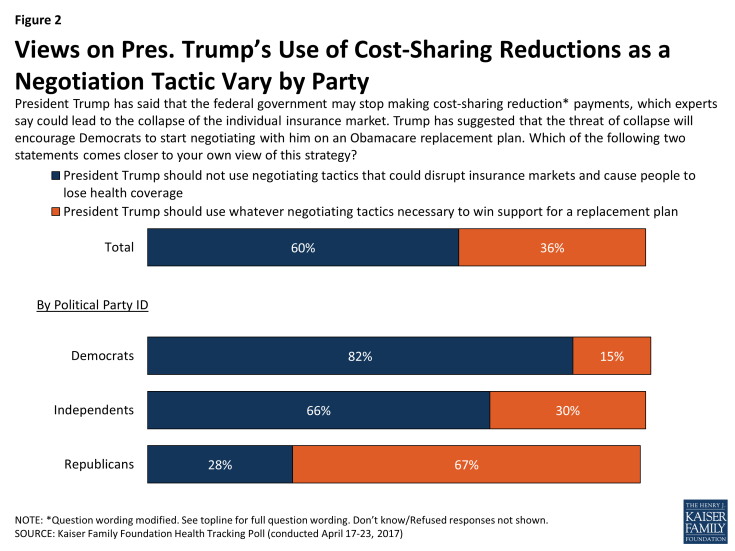
Figure 2: Views on Pres. Trump’s Use of Cost-Sharing Reductions as a Negotiation Tactic Vary by Party
Health Insurance Exchanges
Recently, some major health insurers have announced they are withdrawing from some ACA exchanges — marketplaces where people who do not have employer-sponsored health insurance can buy coverage. Slightly less than half of the public say they have been closely following news about health insurance companies’ decisions on whether or not to sell plans through the marketplaces – with about one in ten saying they have been following the news “very closely.”
Overall, the majority of the public say health insurance companies choosing not to sell insurance plans in certain marketplaces is a “big problem” across the country (65 percent) with an additional 21 percent saying it is a “small problem.” When asked about their local area, 43 percent say it is a “big problem” with another third saying it is a “small problem.” These perceptions are similar across parties.
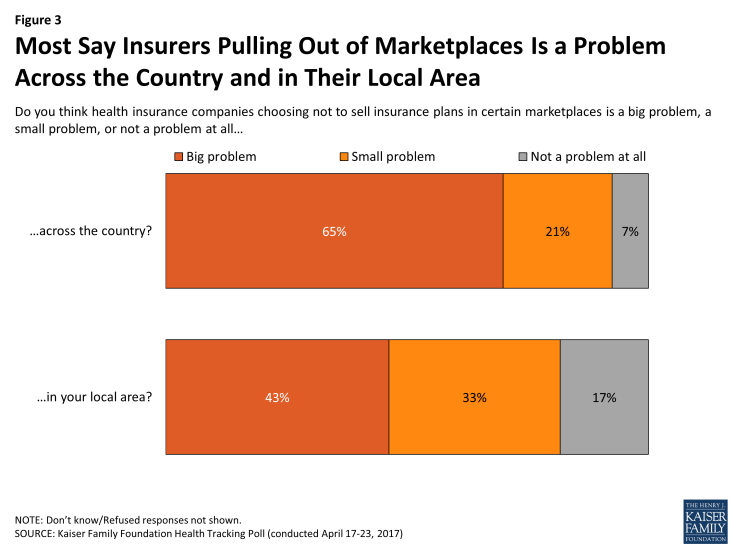
Figure 3: Most Say Insurers Pulling Out of Marketplaces Is a Problem Across the Country and in Their Local Area
Majorities Say Uncertainty over ACA’s Future is Hurting Individuals Who Buy Their Own Health Insurance
A large share (70 percent), including majorities across parties, says that uncertainty around the future of the law is hurting the group that is most directly affected by the ACA – individuals who purchase their own health insurance. The public is less likely to say that the uncertainty is hurting insurance companies or them and their families.
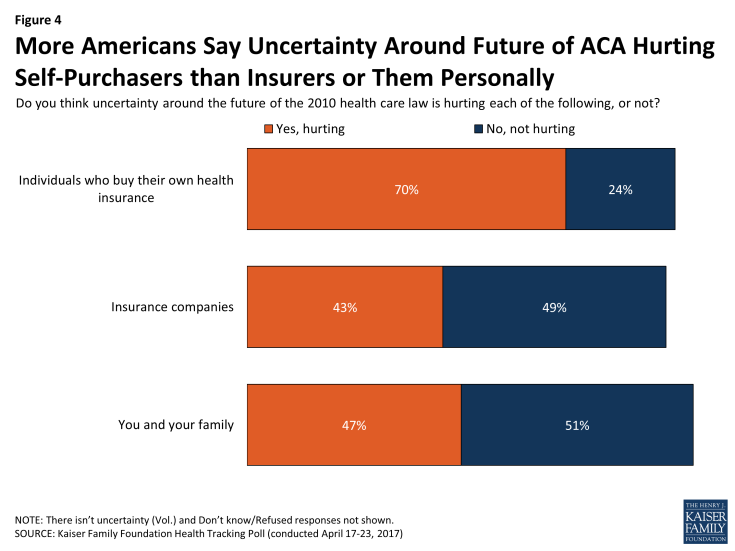
Figure 4: More Americans Say Uncertainty Around Future of ACA Hurting Self-Purchasers than Insurers or Them Personally
The Public Thinks President Trump and Republicans Have Control Over Making the ACA Work or Fail
When asked how much control, if any, various groups have over whether the current health care law works or fails, large majorities of the public say Republicans in Congress and President Trump and his administration have at least some control. Eight in ten say Republicans in Congress have “a lot” or “some” control over whether the current health care works or fails – including half (47 percent) who say they have “a lot” of control. This is somewhat similar to the share (75 percent) who say President Trump and his administration have at least some control, including 43 percent who say he has “a lot” of control. Smaller shares say Democrats in Congress (56 percent), their own representatives in Congress (51 percent), and their state’s governor (48 percent) have at least some control.
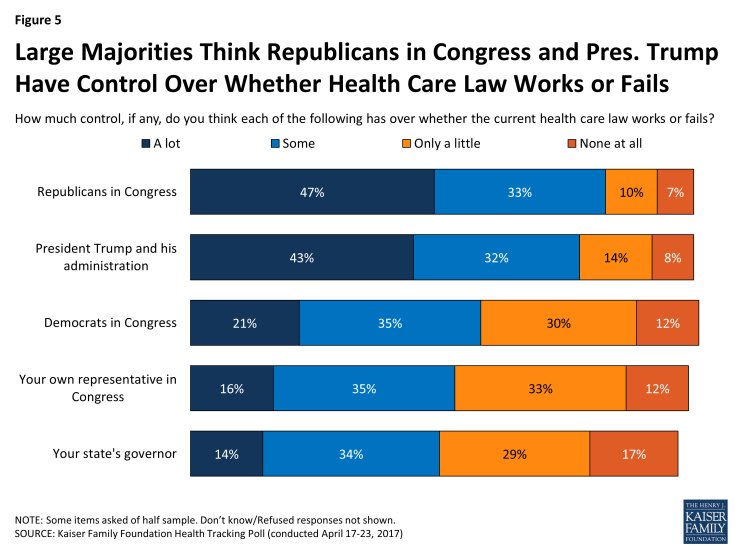
Figure 5: Large Majorities Think Republicans in Congress and Pres. Trump Have Control Over Whether Health Care Law Works or Fails
The vast majority of Republicans (80 percent), Democrats (86 percent), and independents (82 percent) say Republicans in Congress have at least some control while fewer – across parties – say the same about Democrats in Congress (64 percent, 51 percent, and 57 percent, respectively).
Majorities Say President Trump and Republicans Should Make the Current Health Care Law Work, Are Responsible For It Going Forward
In addition to most of the public saying President Trump and Republicans have at least some control over the future of the ACA, three-fourths (74 percent) of the public think Trump and his administration should do what they can to make the current health care law work while one-fifth (19 percent) say President Trump and his administration should do what they can to make the ACA fail so they can replace it later.
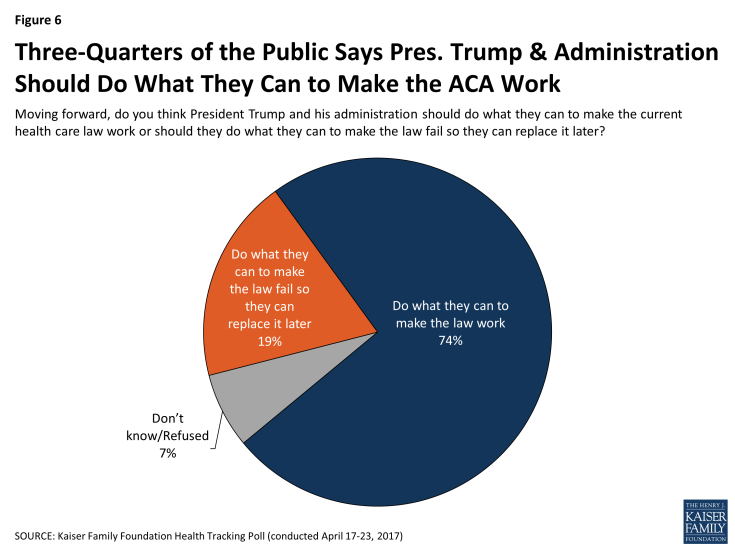
Figure 6: Three-Quarters of the Public Says Pres. Trump & Administration Should Do What They Can to Make the ACA Work
Nine in ten Democrats (91 percent) and eight in ten independents (79 percent) say Trump and his administration should do what they can to make the law work as do half of Republicans. Among Trump supporters, more say Trump and his administration should do what they can to make the law work (53 percent) than say they should do what they can to make the law fail so they can replace it later (35 percent).
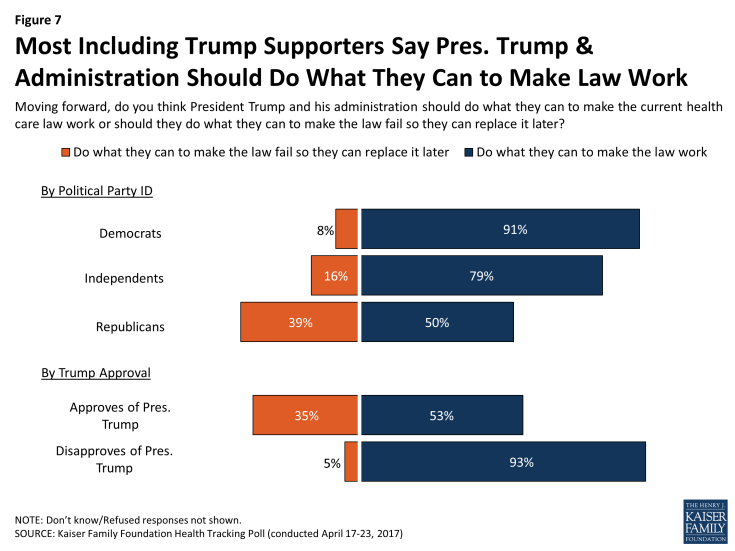
Figure 7: Most Including Trump Supporters Say Pres. Trump & Administration Should Do What They Can to Make Law Work
In addition, a majority (64 percent) of the public say that because President Trump and Republicans in Congress are now in control of the government, they are responsible for any problems with the ACA moving forward. About three in ten (28 percent) say that because President Obama and Democrats in Congress passed the law, they are responsible for any problems with it moving forward.
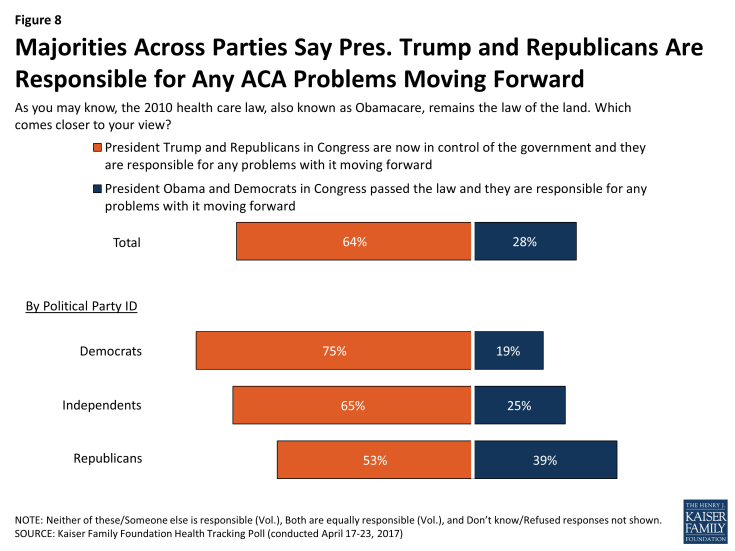
Figure 8: Majorities Across Parties Say Pres. Trump and Republicans Are Responsible for Any ACA Problems Moving Forward
Half of Republicans (53 percent) say President Trump and Republicans in Congress are now responsible for any problems with the ACA going forward, up significantly from 34 percent earlier this month.2 Large shares of Democrats and independents still say President Trump and Republicans in Congress are responsible for any problems with the law moving forward.
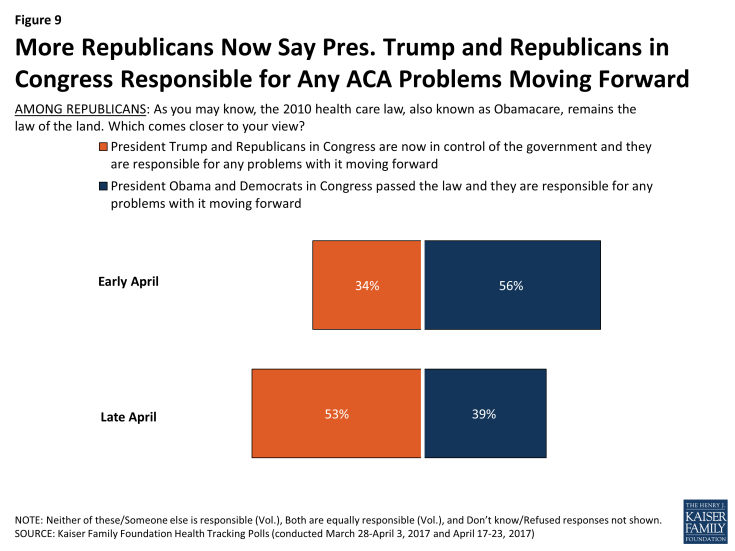
Figure 9: More Republicans Now Say Pres. Trump and Republicans in Congress Responsible for Any ACA Problems Moving Forward
Plans to Repeal and Replace the ACA
Since House Republicans pulled their replacement plan from a vote last month, plans to repeal and replace the Affordable Care Act have been on-again, off-again. More Americans want President Trump and Republican lawmakers to keep working on a plan to repeal and replace the ACA than want them to stop working on health care and move on to other priorities (51 percent vs. 43 percent).
Republicans and those who say they approve of President Trump are more likely to say they want President Trump and Republicans to keep working on a replacement plan (82 percent and 78 percent, respectively). On the other hand, Democrats and those who disapprove of President Trump are more likely to say they should stop working on health care and move on to other priorities (70 percent and 65 percent, respectively). Independents are divided, with similar shares saying Trump and Republicans should keep working on health care (48 percent) as say they should move on to other priorities (45 percent).
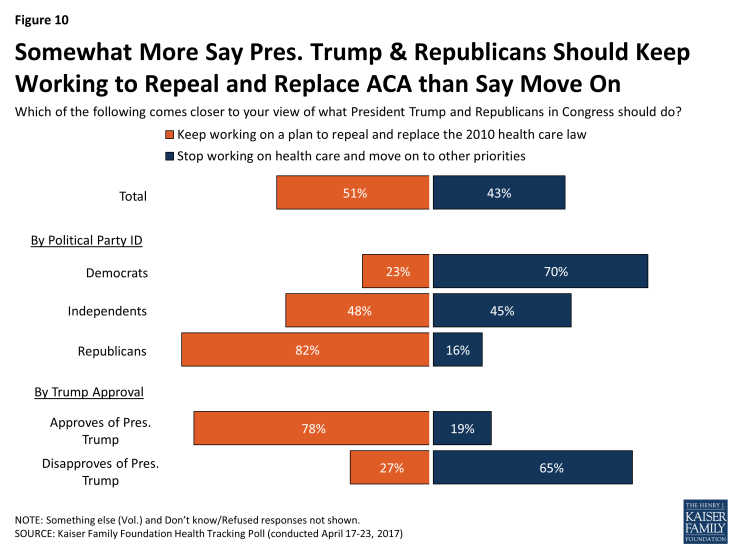
Figure 10: Somewhat More Say Pres. Trump & Republicans Should Keep Working to Repeal and Replace ACA than Say Move On
The Public Leans Favorable in Attitudes Towards the ACA
The public is more favorable than unfavorable in their views of the 2010 health care law this month with 48 percent expressing a favorable view compared to 41 percent expressing an unfavorable view. This split is largely partisan with seven in ten Republicans (72 percent) expressing an unfavorable view and three-fourths (73 percent) of Democrats expressing a favorable opinion of the law. A larger share of independents have a favorable view (48 percent) than an unfavorable view (37 percent).
Lowering Costs for Individuals Is Public’s Top Health Care Priority for President Trump and Congress, Repealing ACA Ranks Lower
When asked about a series of health care priorities for President Trump and Congress to act on, about six in ten of the public say lowering the amount individuals pay for health care (63 percent) and lowering the cost of prescription drugs (60 percent) should each be a “top priority” for President Trump and Congress. This is followed by half who say dealing with the prescription painkiller addiction epidemic should be a “top priority.”
Despite the ongoing discussion about repealing the ACA, this falls much lower on the list of the public’s health care priorities, with 32 percent saying it should be a “top priority” for President Trump and Congress, similar to the shares who say decreasing the role of the federal government in health care (33 percent) and decreasing how much the federal government spends on health care over time (30 percent) should be top priorities. In fact, the share who say repealing the 2010 health care law should be a “top priority” has decreased from 37 percent in December 2016.3
For Republicans, Repealing the ACA is Still Most Important Priority
When asked the “most important priority” for President Trump and Congress when it comes to health care, lowering the amount individuals pay for health care and lowering the cost of prescription drugs are most prioritized by the public – and by Democrats and independents. On the other hand, one-fourth of Republicans (27 percent) say repealing the 2010 health care law is the most important health care priority.
| Table 1: Views of Most Important Health Care Priority by Party Identification | ||||
| Percent who say each is the most important priority: | Total | Party ID | ||
| Democrats | Independents | Republicans | ||
| Lowering the amount individuals pay for health care | 33% | 44% | 33% | 22% |
| Lowering the cost of prescription drugs | 19 | 23 | 20 | 15 |
| Repealing the 2010 health care law | 11 | 3 | 8 | 27 |
| Dealing with the prescription painkiller addiction epidemic | 10 | 13 | 10 | 7 |
| Decreasing the role of the federal government in health care | 9 | 2 | 9 | 14 |
| Decreasing how much the federal government spends on health care | 4 | 3 | 4 | 5 |
Federal Budget Priorities: Health Care
With lawmakers debating spending priorities in advance of a key budget deadline, few Americans want to see the president and Congress decrease funding in a variety of different health areas. In fact, a majority of Americans want to see the president and Congress increase spending on veteran’s medical care (77 percent), medical research to find cures for major illnesses (58 percent), and Medicare (57 percent). The only health area that has a larger share of the public saying they want the president and Congress to decrease spending rather than increase spending is on efforts to improve health for people in developing countries, with one-third saying they want to see spending decreased in this area.
The Role of Planned Parenthood in the Federal Budget
One in five Americans (21 percent) say they want the president and Congress to decrease spending on reproductive health services, such as family planning and birth control for lower-income women. Some Republicans have proposed using the budget process to stop federal Medicaid payments to Planned Parenthood for the health care services they provide to low-income women. Overall, three-fourths (73 percent) of the public thinks federal Medicaid payments to Planned Parenthood should continue while 24 percent think that these payments should stop. When asked whether stopping these payments is so important that it would be worth shutting down the federal government, one in ten of the public overall say stopping these payments is that important.

